Comprehensive Essay on UK Legal System, Government, and Contracts
VerifiedAdded on 2023/01/12
|9
|2125
|57
Essay
AI Summary
This essay provides a comprehensive overview of the UK legal system, examining its various components and key areas of law. It begins by outlining the roles of the three main organs of government: the executive, legislature, and judiciary, detailing their functions and interrelationships. The essay then delves into contract law, specifically addressing the remedy of specific performance, its application, and limitations. It further explores the differences between general partnerships and companies, highlighting distinctions in formation, liability, and taxation. The essay also discusses the ethical and practical aspects of employee dismissal, outlining different methods and considerations. Finally, the essay provides a conclusion summarizing the key points and referencing relevant literature, offering a well-rounded analysis of the UK legal system and its practical implications in areas such as public, commercial, corporate, and employment law.
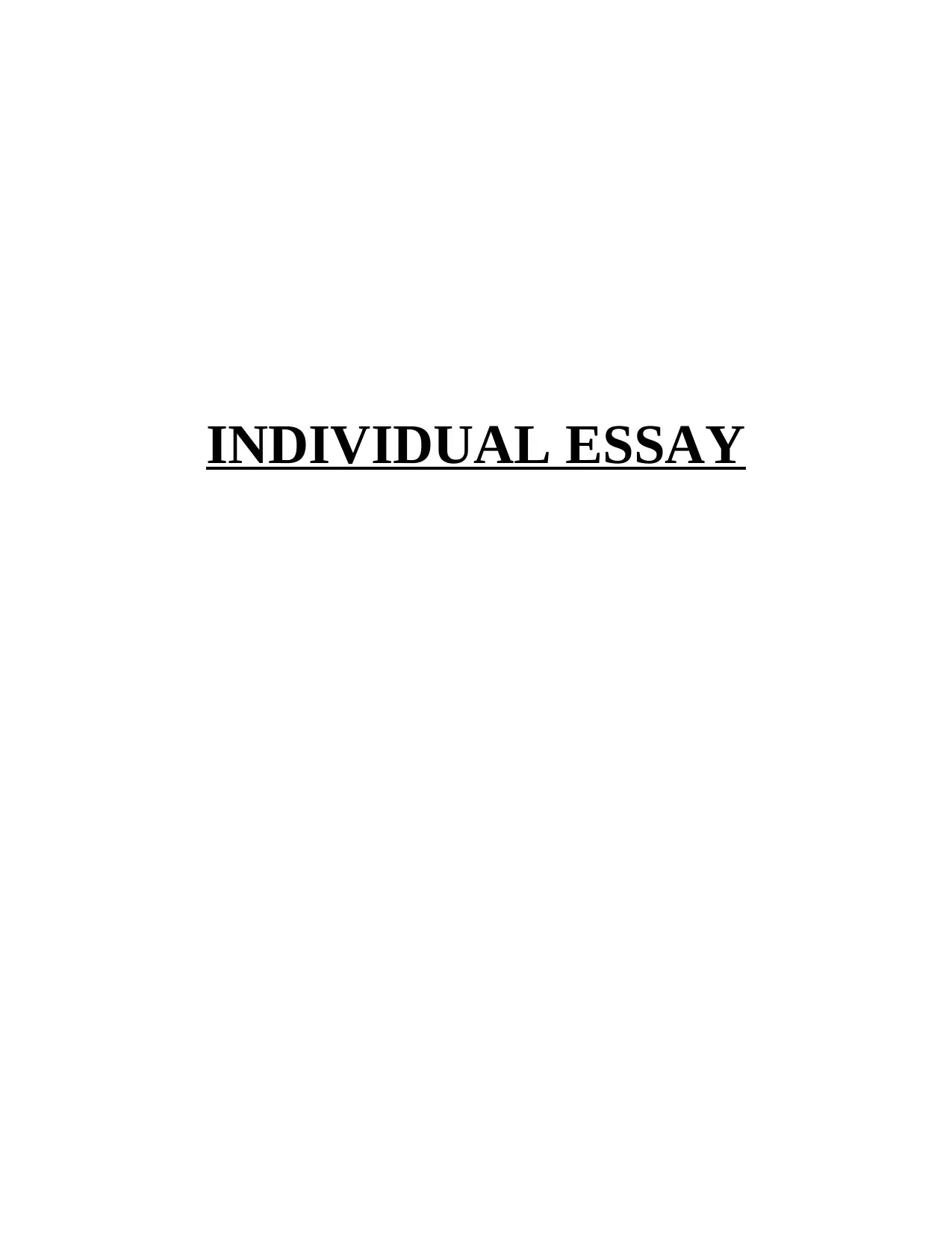
INDIVIDUAL ESSAY
Paraphrase This Document
Need a fresh take? Get an instant paraphrase of this document with our AI Paraphraser
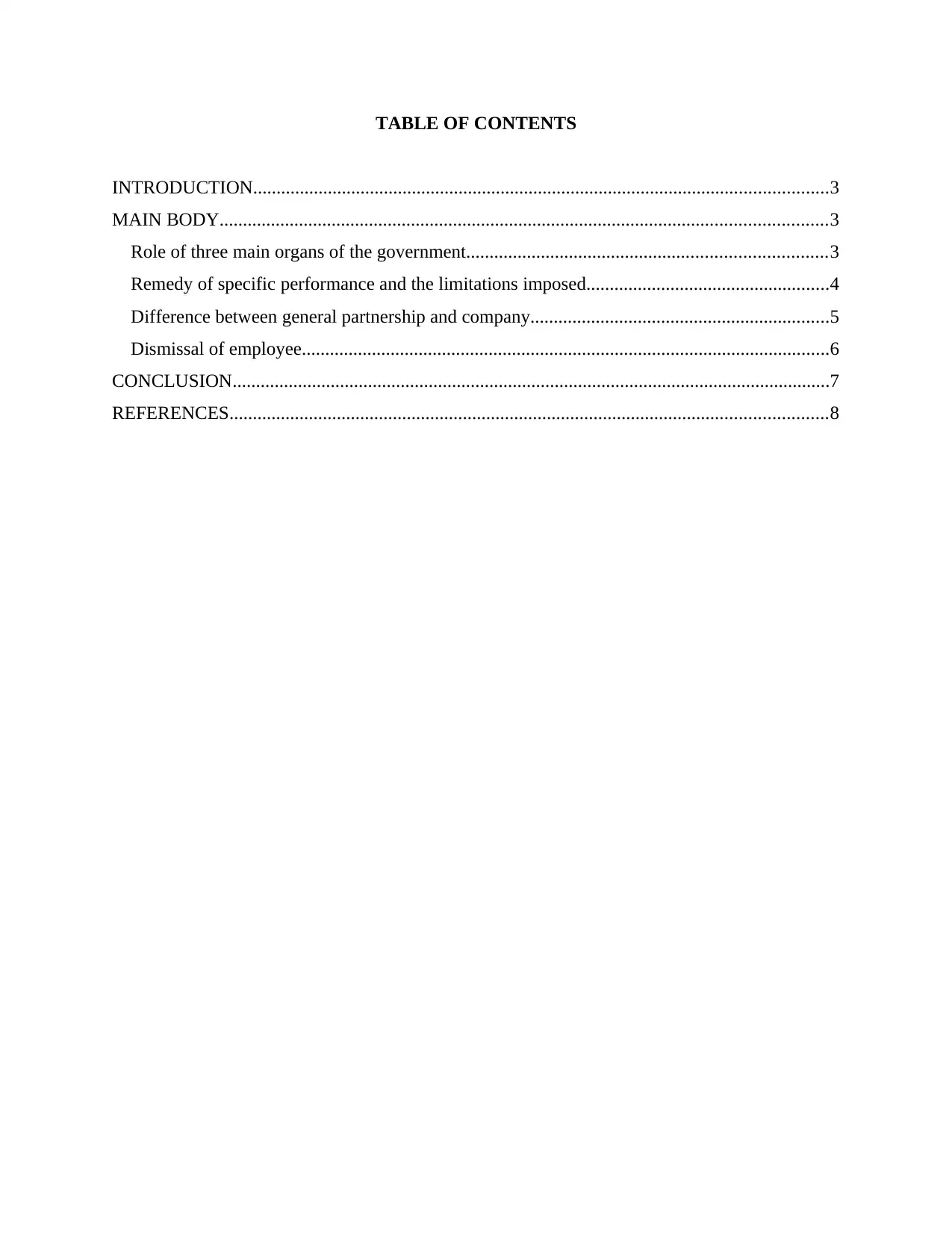
TABLE OF CONTENTS
INTRODUCTION...........................................................................................................................3
MAIN BODY..................................................................................................................................3
Role of three main organs of the government.............................................................................3
Remedy of specific performance and the limitations imposed....................................................4
Difference between general partnership and company................................................................5
Dismissal of employee.................................................................................................................6
CONCLUSION................................................................................................................................7
REFERENCES................................................................................................................................8
INTRODUCTION...........................................................................................................................3
MAIN BODY..................................................................................................................................3
Role of three main organs of the government.............................................................................3
Remedy of specific performance and the limitations imposed....................................................4
Difference between general partnership and company................................................................5
Dismissal of employee.................................................................................................................6
CONCLUSION................................................................................................................................7
REFERENCES................................................................................................................................8
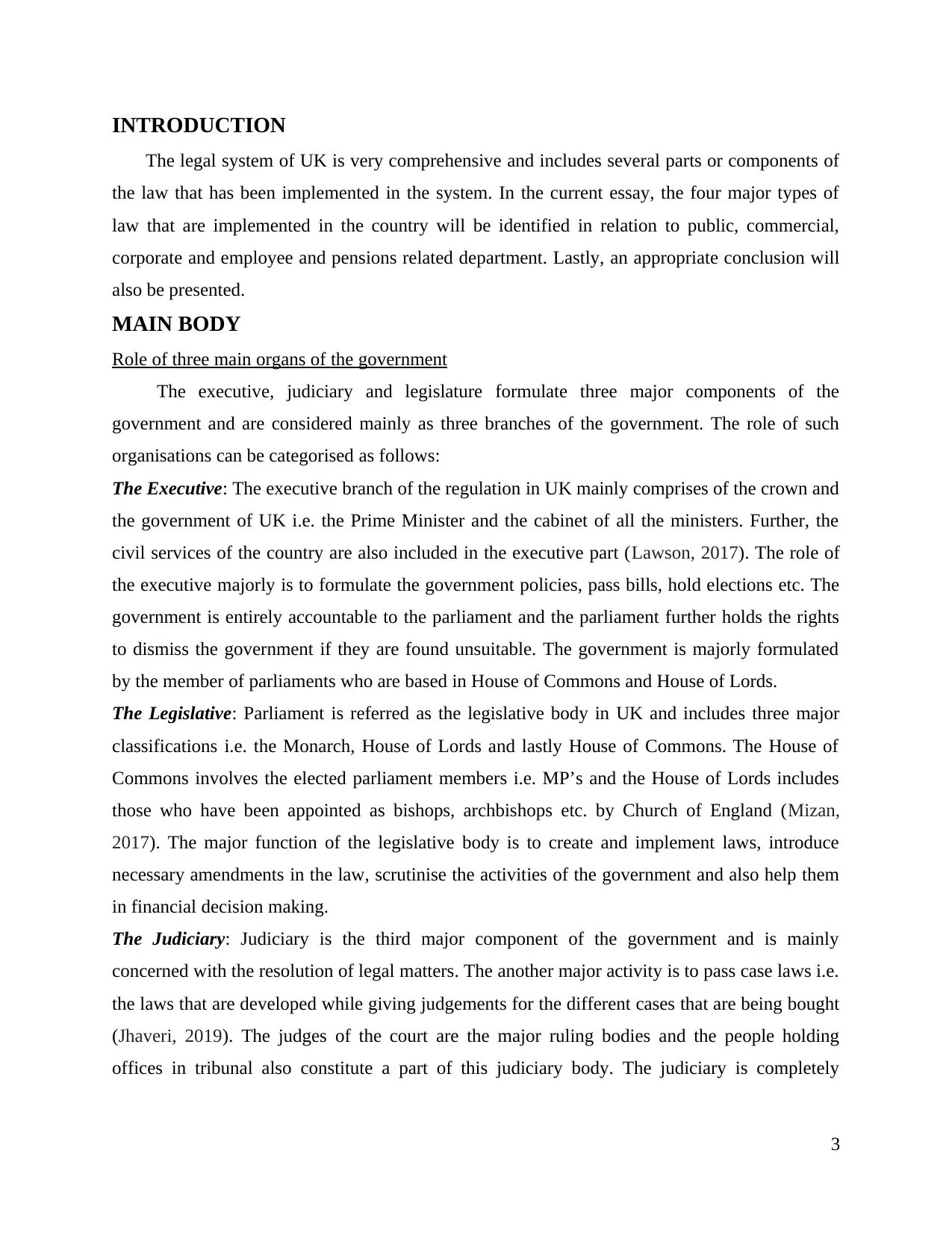
INTRODUCTION
The legal system of UK is very comprehensive and includes several parts or components of
the law that has been implemented in the system. In the current essay, the four major types of
law that are implemented in the country will be identified in relation to public, commercial,
corporate and employee and pensions related department. Lastly, an appropriate conclusion will
also be presented.
MAIN BODY
Role of three main organs of the government
The executive, judiciary and legislature formulate three major components of the
government and are considered mainly as three branches of the government. The role of such
organisations can be categorised as follows:
The Executive: The executive branch of the regulation in UK mainly comprises of the crown and
the government of UK i.e. the Prime Minister and the cabinet of all the ministers. Further, the
civil services of the country are also included in the executive part (Lawson, 2017). The role of
the executive majorly is to formulate the government policies, pass bills, hold elections etc. The
government is entirely accountable to the parliament and the parliament further holds the rights
to dismiss the government if they are found unsuitable. The government is majorly formulated
by the member of parliaments who are based in House of Commons and House of Lords.
The Legislative: Parliament is referred as the legislative body in UK and includes three major
classifications i.e. the Monarch, House of Lords and lastly House of Commons. The House of
Commons involves the elected parliament members i.e. MP’s and the House of Lords includes
those who have been appointed as bishops, archbishops etc. by Church of England (Mizan,
2017). The major function of the legislative body is to create and implement laws, introduce
necessary amendments in the law, scrutinise the activities of the government and also help them
in financial decision making.
The Judiciary: Judiciary is the third major component of the government and is mainly
concerned with the resolution of legal matters. The another major activity is to pass case laws i.e.
the laws that are developed while giving judgements for the different cases that are being bought
(Jhaveri, 2019). The judges of the court are the major ruling bodies and the people holding
offices in tribunal also constitute a part of this judiciary body. The judiciary is completely
3
The legal system of UK is very comprehensive and includes several parts or components of
the law that has been implemented in the system. In the current essay, the four major types of
law that are implemented in the country will be identified in relation to public, commercial,
corporate and employee and pensions related department. Lastly, an appropriate conclusion will
also be presented.
MAIN BODY
Role of three main organs of the government
The executive, judiciary and legislature formulate three major components of the
government and are considered mainly as three branches of the government. The role of such
organisations can be categorised as follows:
The Executive: The executive branch of the regulation in UK mainly comprises of the crown and
the government of UK i.e. the Prime Minister and the cabinet of all the ministers. Further, the
civil services of the country are also included in the executive part (Lawson, 2017). The role of
the executive majorly is to formulate the government policies, pass bills, hold elections etc. The
government is entirely accountable to the parliament and the parliament further holds the rights
to dismiss the government if they are found unsuitable. The government is majorly formulated
by the member of parliaments who are based in House of Commons and House of Lords.
The Legislative: Parliament is referred as the legislative body in UK and includes three major
classifications i.e. the Monarch, House of Lords and lastly House of Commons. The House of
Commons involves the elected parliament members i.e. MP’s and the House of Lords includes
those who have been appointed as bishops, archbishops etc. by Church of England (Mizan,
2017). The major function of the legislative body is to create and implement laws, introduce
necessary amendments in the law, scrutinise the activities of the government and also help them
in financial decision making.
The Judiciary: Judiciary is the third major component of the government and is mainly
concerned with the resolution of legal matters. The another major activity is to pass case laws i.e.
the laws that are developed while giving judgements for the different cases that are being bought
(Jhaveri, 2019). The judges of the court are the major ruling bodies and the people holding
offices in tribunal also constitute a part of this judiciary body. The judiciary is completely
3
⊘ This is a preview!⊘
Do you want full access?
Subscribe today to unlock all pages.

Trusted by 1+ million students worldwide
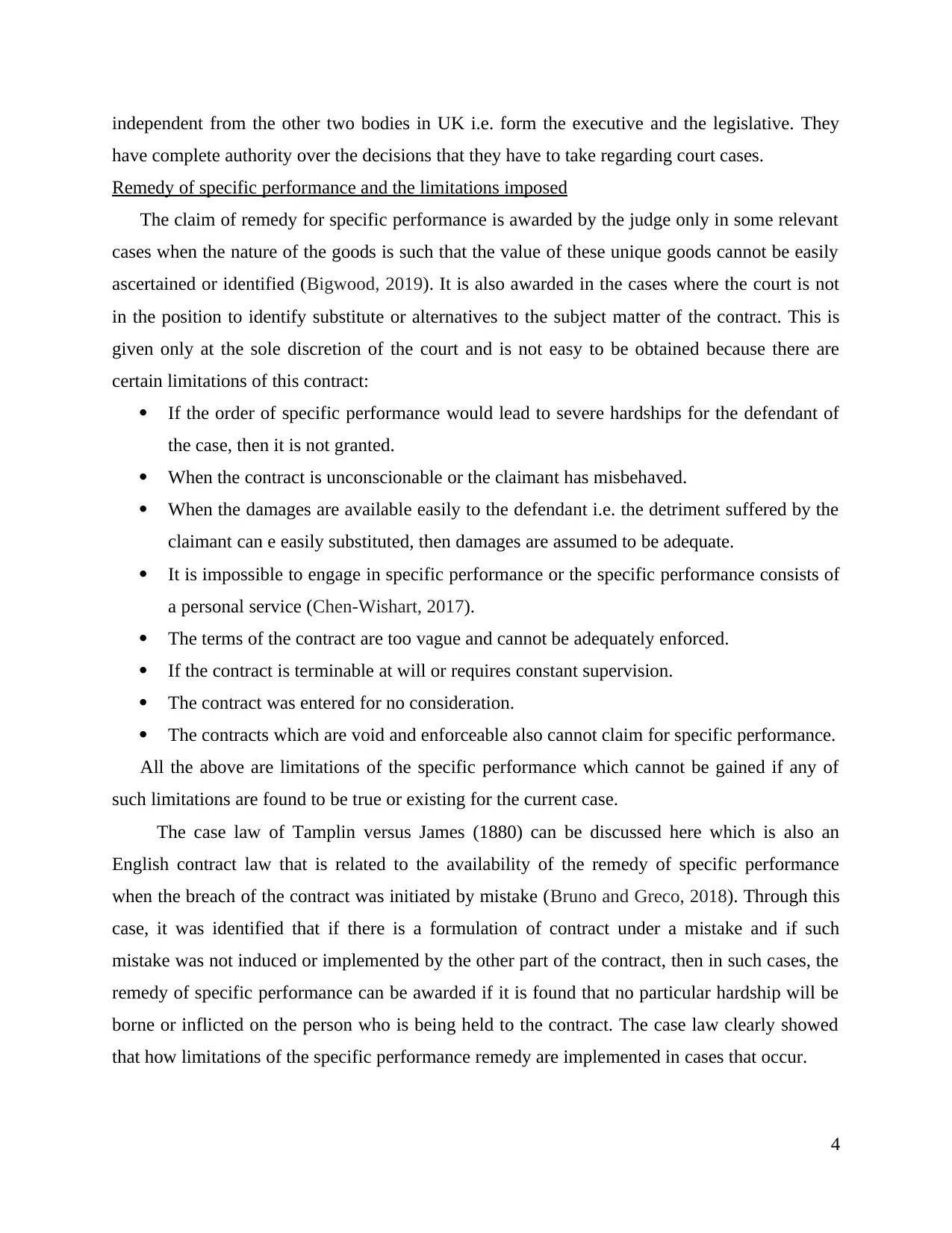
independent from the other two bodies in UK i.e. form the executive and the legislative. They
have complete authority over the decisions that they have to take regarding court cases.
Remedy of specific performance and the limitations imposed
The claim of remedy for specific performance is awarded by the judge only in some relevant
cases when the nature of the goods is such that the value of these unique goods cannot be easily
ascertained or identified (Bigwood, 2019). It is also awarded in the cases where the court is not
in the position to identify substitute or alternatives to the subject matter of the contract. This is
given only at the sole discretion of the court and is not easy to be obtained because there are
certain limitations of this contract:
If the order of specific performance would lead to severe hardships for the defendant of
the case, then it is not granted.
When the contract is unconscionable or the claimant has misbehaved.
When the damages are available easily to the defendant i.e. the detriment suffered by the
claimant can e easily substituted, then damages are assumed to be adequate.
It is impossible to engage in specific performance or the specific performance consists of
a personal service (Chen-Wishart, 2017).
The terms of the contract are too vague and cannot be adequately enforced.
If the contract is terminable at will or requires constant supervision.
The contract was entered for no consideration.
The contracts which are void and enforceable also cannot claim for specific performance.
All the above are limitations of the specific performance which cannot be gained if any of
such limitations are found to be true or existing for the current case.
The case law of Tamplin versus James (1880) can be discussed here which is also an
English contract law that is related to the availability of the remedy of specific performance
when the breach of the contract was initiated by mistake (Bruno and Greco, 2018). Through this
case, it was identified that if there is a formulation of contract under a mistake and if such
mistake was not induced or implemented by the other part of the contract, then in such cases, the
remedy of specific performance can be awarded if it is found that no particular hardship will be
borne or inflicted on the person who is being held to the contract. The case law clearly showed
that how limitations of the specific performance remedy are implemented in cases that occur.
4
have complete authority over the decisions that they have to take regarding court cases.
Remedy of specific performance and the limitations imposed
The claim of remedy for specific performance is awarded by the judge only in some relevant
cases when the nature of the goods is such that the value of these unique goods cannot be easily
ascertained or identified (Bigwood, 2019). It is also awarded in the cases where the court is not
in the position to identify substitute or alternatives to the subject matter of the contract. This is
given only at the sole discretion of the court and is not easy to be obtained because there are
certain limitations of this contract:
If the order of specific performance would lead to severe hardships for the defendant of
the case, then it is not granted.
When the contract is unconscionable or the claimant has misbehaved.
When the damages are available easily to the defendant i.e. the detriment suffered by the
claimant can e easily substituted, then damages are assumed to be adequate.
It is impossible to engage in specific performance or the specific performance consists of
a personal service (Chen-Wishart, 2017).
The terms of the contract are too vague and cannot be adequately enforced.
If the contract is terminable at will or requires constant supervision.
The contract was entered for no consideration.
The contracts which are void and enforceable also cannot claim for specific performance.
All the above are limitations of the specific performance which cannot be gained if any of
such limitations are found to be true or existing for the current case.
The case law of Tamplin versus James (1880) can be discussed here which is also an
English contract law that is related to the availability of the remedy of specific performance
when the breach of the contract was initiated by mistake (Bruno and Greco, 2018). Through this
case, it was identified that if there is a formulation of contract under a mistake and if such
mistake was not induced or implemented by the other part of the contract, then in such cases, the
remedy of specific performance can be awarded if it is found that no particular hardship will be
borne or inflicted on the person who is being held to the contract. The case law clearly showed
that how limitations of the specific performance remedy are implemented in cases that occur.
4
Paraphrase This Document
Need a fresh take? Get an instant paraphrase of this document with our AI Paraphraser
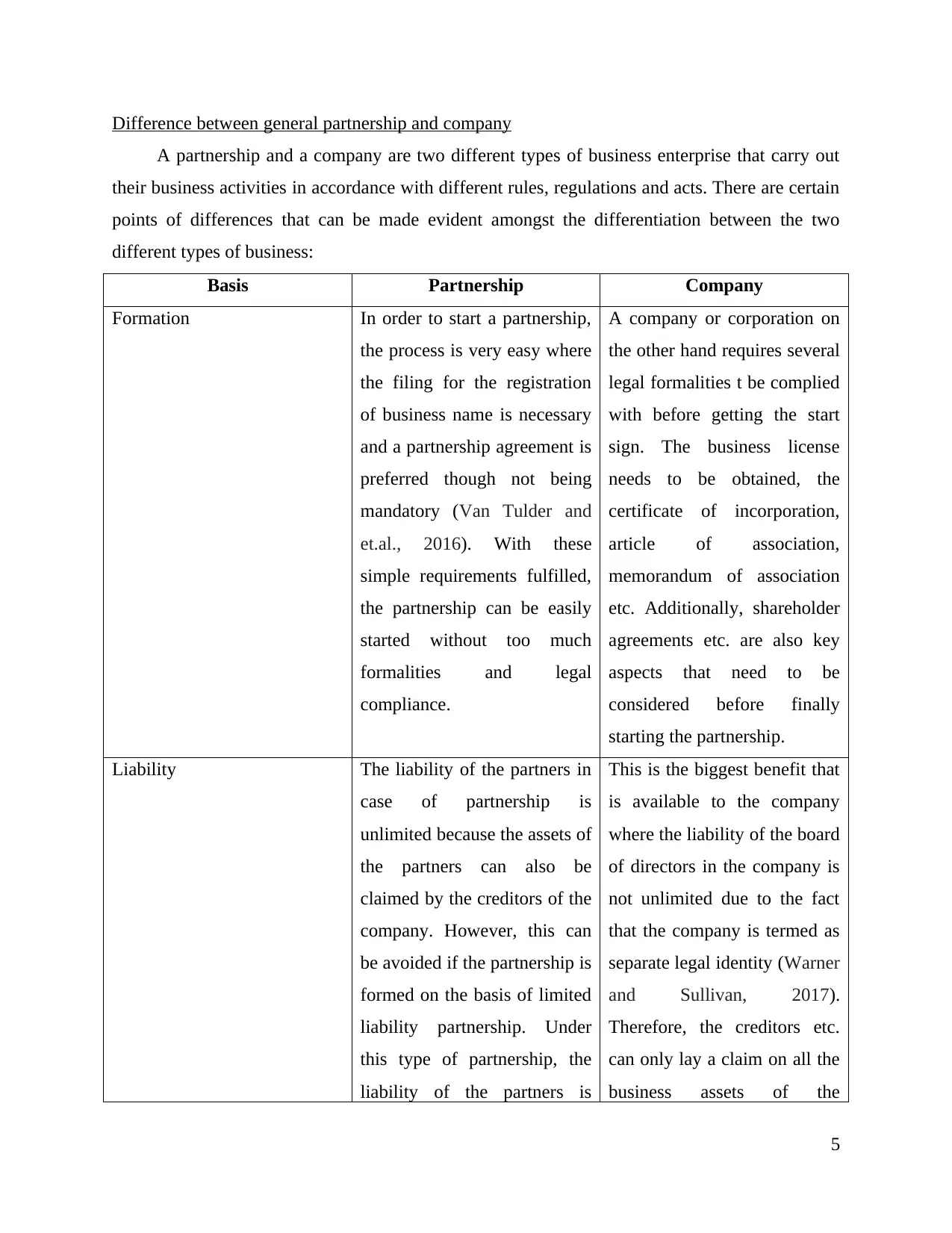
Difference between general partnership and company
A partnership and a company are two different types of business enterprise that carry out
their business activities in accordance with different rules, regulations and acts. There are certain
points of differences that can be made evident amongst the differentiation between the two
different types of business:
Basis Partnership Company
Formation In order to start a partnership,
the process is very easy where
the filing for the registration
of business name is necessary
and a partnership agreement is
preferred though not being
mandatory (Van Tulder and
et.al., 2016). With these
simple requirements fulfilled,
the partnership can be easily
started without too much
formalities and legal
compliance.
A company or corporation on
the other hand requires several
legal formalities t be complied
with before getting the start
sign. The business license
needs to be obtained, the
certificate of incorporation,
article of association,
memorandum of association
etc. Additionally, shareholder
agreements etc. are also key
aspects that need to be
considered before finally
starting the partnership.
Liability The liability of the partners in
case of partnership is
unlimited because the assets of
the partners can also be
claimed by the creditors of the
company. However, this can
be avoided if the partnership is
formed on the basis of limited
liability partnership. Under
this type of partnership, the
liability of the partners is
This is the biggest benefit that
is available to the company
where the liability of the board
of directors in the company is
not unlimited due to the fact
that the company is termed as
separate legal identity (Warner
and Sullivan, 2017).
Therefore, the creditors etc.
can only lay a claim on all the
business assets of the
5
A partnership and a company are two different types of business enterprise that carry out
their business activities in accordance with different rules, regulations and acts. There are certain
points of differences that can be made evident amongst the differentiation between the two
different types of business:
Basis Partnership Company
Formation In order to start a partnership,
the process is very easy where
the filing for the registration
of business name is necessary
and a partnership agreement is
preferred though not being
mandatory (Van Tulder and
et.al., 2016). With these
simple requirements fulfilled,
the partnership can be easily
started without too much
formalities and legal
compliance.
A company or corporation on
the other hand requires several
legal formalities t be complied
with before getting the start
sign. The business license
needs to be obtained, the
certificate of incorporation,
article of association,
memorandum of association
etc. Additionally, shareholder
agreements etc. are also key
aspects that need to be
considered before finally
starting the partnership.
Liability The liability of the partners in
case of partnership is
unlimited because the assets of
the partners can also be
claimed by the creditors of the
company. However, this can
be avoided if the partnership is
formed on the basis of limited
liability partnership. Under
this type of partnership, the
liability of the partners is
This is the biggest benefit that
is available to the company
where the liability of the board
of directors in the company is
not unlimited due to the fact
that the company is termed as
separate legal identity (Warner
and Sullivan, 2017).
Therefore, the creditors etc.
can only lay a claim on all the
business assets of the
5
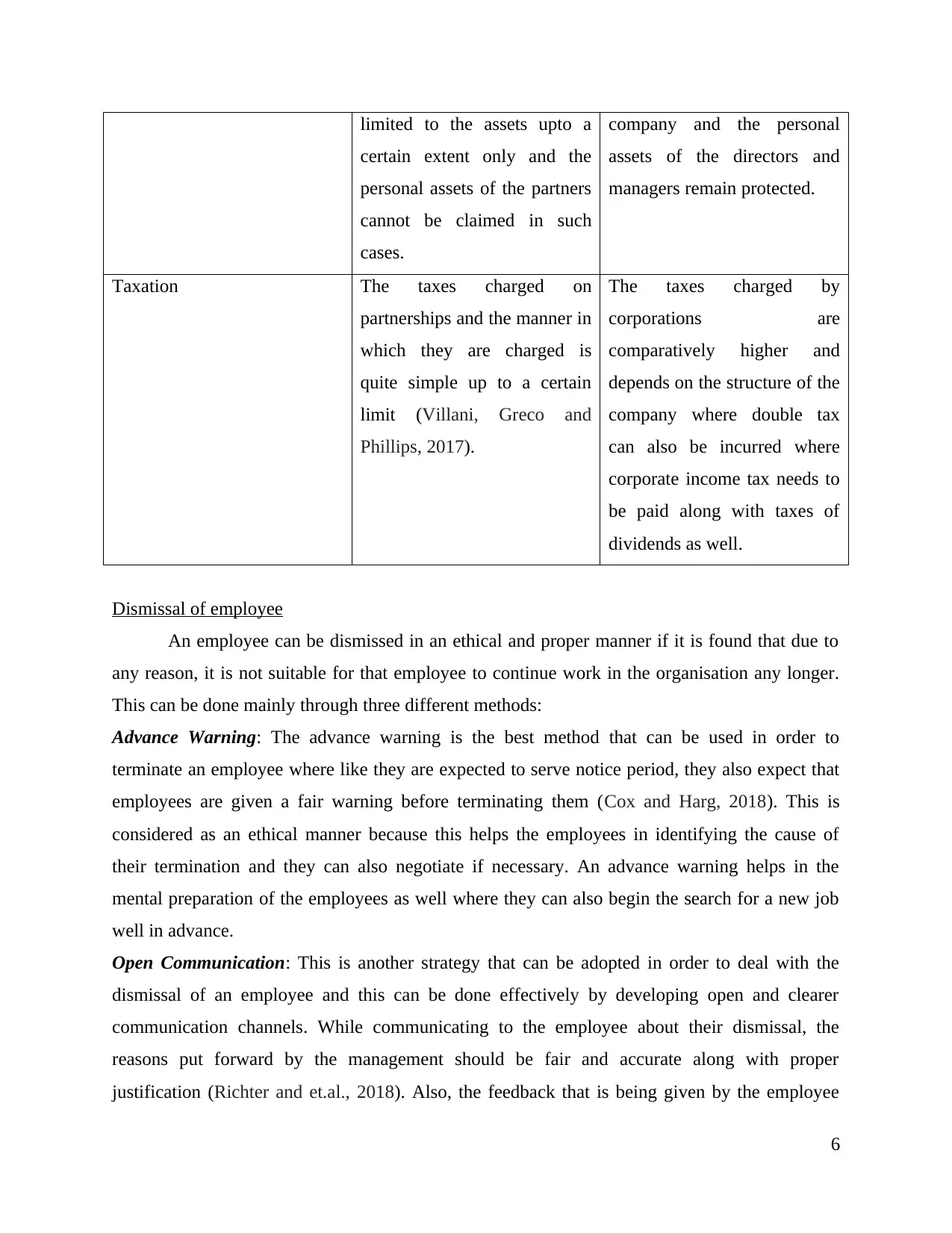
limited to the assets upto a
certain extent only and the
personal assets of the partners
cannot be claimed in such
cases.
company and the personal
assets of the directors and
managers remain protected.
Taxation The taxes charged on
partnerships and the manner in
which they are charged is
quite simple up to a certain
limit (Villani, Greco and
Phillips, 2017).
The taxes charged by
corporations are
comparatively higher and
depends on the structure of the
company where double tax
can also be incurred where
corporate income tax needs to
be paid along with taxes of
dividends as well.
Dismissal of employee
An employee can be dismissed in an ethical and proper manner if it is found that due to
any reason, it is not suitable for that employee to continue work in the organisation any longer.
This can be done mainly through three different methods:
Advance Warning: The advance warning is the best method that can be used in order to
terminate an employee where like they are expected to serve notice period, they also expect that
employees are given a fair warning before terminating them (Cox and Harg, 2018). This is
considered as an ethical manner because this helps the employees in identifying the cause of
their termination and they can also negotiate if necessary. An advance warning helps in the
mental preparation of the employees as well where they can also begin the search for a new job
well in advance.
Open Communication: This is another strategy that can be adopted in order to deal with the
dismissal of an employee and this can be done effectively by developing open and clearer
communication channels. While communicating to the employee about their dismissal, the
reasons put forward by the management should be fair and accurate along with proper
justification (Richter and et.al., 2018). Also, the feedback that is being given by the employee
6
certain extent only and the
personal assets of the partners
cannot be claimed in such
cases.
company and the personal
assets of the directors and
managers remain protected.
Taxation The taxes charged on
partnerships and the manner in
which they are charged is
quite simple up to a certain
limit (Villani, Greco and
Phillips, 2017).
The taxes charged by
corporations are
comparatively higher and
depends on the structure of the
company where double tax
can also be incurred where
corporate income tax needs to
be paid along with taxes of
dividends as well.
Dismissal of employee
An employee can be dismissed in an ethical and proper manner if it is found that due to
any reason, it is not suitable for that employee to continue work in the organisation any longer.
This can be done mainly through three different methods:
Advance Warning: The advance warning is the best method that can be used in order to
terminate an employee where like they are expected to serve notice period, they also expect that
employees are given a fair warning before terminating them (Cox and Harg, 2018). This is
considered as an ethical manner because this helps the employees in identifying the cause of
their termination and they can also negotiate if necessary. An advance warning helps in the
mental preparation of the employees as well where they can also begin the search for a new job
well in advance.
Open Communication: This is another strategy that can be adopted in order to deal with the
dismissal of an employee and this can be done effectively by developing open and clearer
communication channels. While communicating to the employee about their dismissal, the
reasons put forward by the management should be fair and accurate along with proper
justification (Richter and et.al., 2018). Also, the feedback that is being given by the employee
6
⊘ This is a preview!⊘
Do you want full access?
Subscribe today to unlock all pages.

Trusted by 1+ million students worldwide
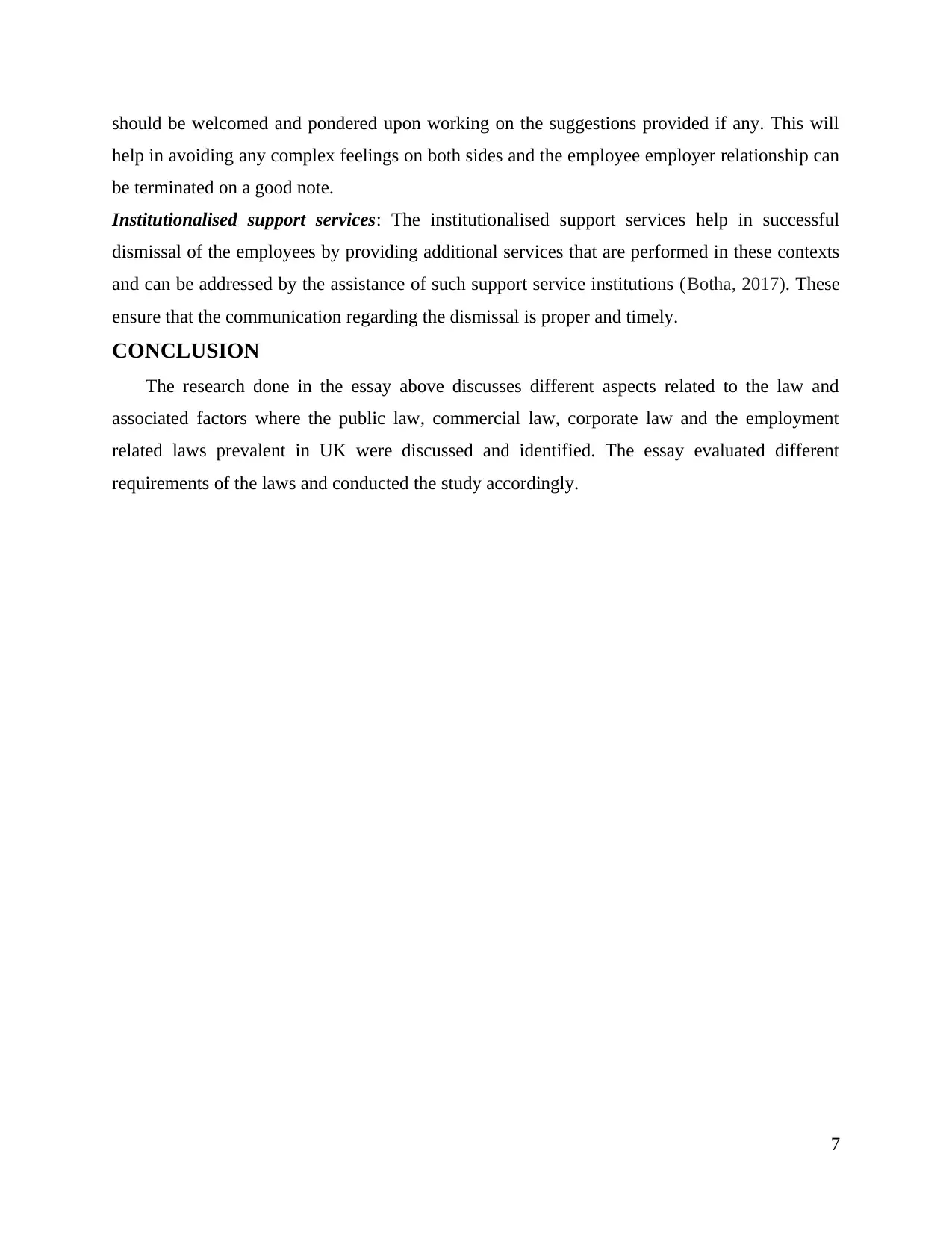
should be welcomed and pondered upon working on the suggestions provided if any. This will
help in avoiding any complex feelings on both sides and the employee employer relationship can
be terminated on a good note.
Institutionalised support services: The institutionalised support services help in successful
dismissal of the employees by providing additional services that are performed in these contexts
and can be addressed by the assistance of such support service institutions (Botha, 2017). These
ensure that the communication regarding the dismissal is proper and timely.
CONCLUSION
The research done in the essay above discusses different aspects related to the law and
associated factors where the public law, commercial law, corporate law and the employment
related laws prevalent in UK were discussed and identified. The essay evaluated different
requirements of the laws and conducted the study accordingly.
7
help in avoiding any complex feelings on both sides and the employee employer relationship can
be terminated on a good note.
Institutionalised support services: The institutionalised support services help in successful
dismissal of the employees by providing additional services that are performed in these contexts
and can be addressed by the assistance of such support service institutions (Botha, 2017). These
ensure that the communication regarding the dismissal is proper and timely.
CONCLUSION
The research done in the essay above discusses different aspects related to the law and
associated factors where the public law, commercial law, corporate law and the employment
related laws prevalent in UK were discussed and identified. The essay evaluated different
requirements of the laws and conducted the study accordingly.
7
Paraphrase This Document
Need a fresh take? Get an instant paraphrase of this document with our AI Paraphraser
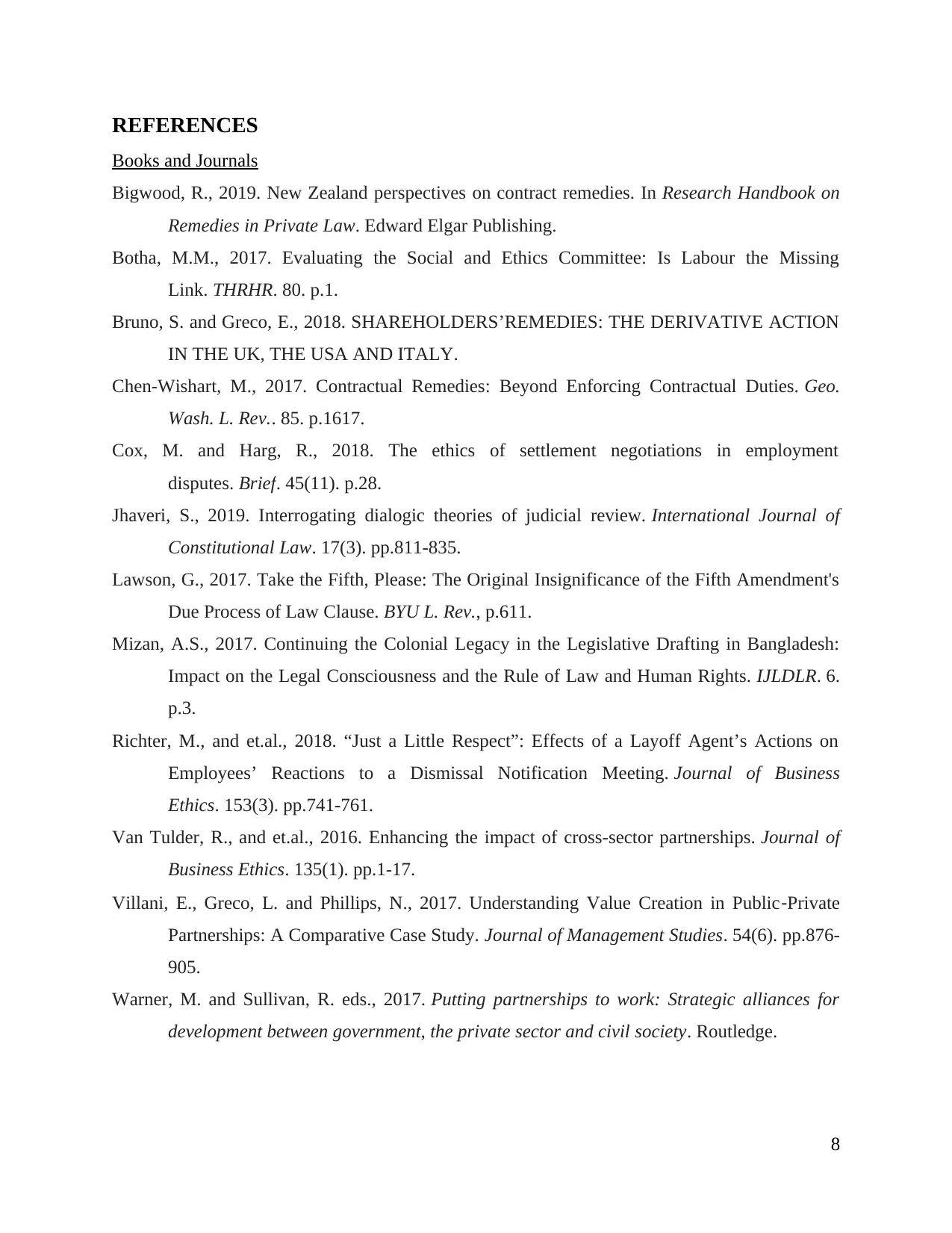
REFERENCES
Books and Journals
Bigwood, R., 2019. New Zealand perspectives on contract remedies. In Research Handbook on
Remedies in Private Law. Edward Elgar Publishing.
Botha, M.M., 2017. Evaluating the Social and Ethics Committee: Is Labour the Missing
Link. THRHR. 80. p.1.
Bruno, S. and Greco, E., 2018. SHAREHOLDERS’REMEDIES: THE DERIVATIVE ACTION
IN THE UK, THE USA AND ITALY.
Chen-Wishart, M., 2017. Contractual Remedies: Beyond Enforcing Contractual Duties. Geo.
Wash. L. Rev.. 85. p.1617.
Cox, M. and Harg, R., 2018. The ethics of settlement negotiations in employment
disputes. Brief. 45(11). p.28.
Jhaveri, S., 2019. Interrogating dialogic theories of judicial review. International Journal of
Constitutional Law. 17(3). pp.811-835.
Lawson, G., 2017. Take the Fifth, Please: The Original Insignificance of the Fifth Amendment's
Due Process of Law Clause. BYU L. Rev., p.611.
Mizan, A.S., 2017. Continuing the Colonial Legacy in the Legislative Drafting in Bangladesh:
Impact on the Legal Consciousness and the Rule of Law and Human Rights. IJLDLR. 6.
p.3.
Richter, M., and et.al., 2018. “Just a Little Respect”: Effects of a Layoff Agent’s Actions on
Employees’ Reactions to a Dismissal Notification Meeting. Journal of Business
Ethics. 153(3). pp.741-761.
Van Tulder, R., and et.al., 2016. Enhancing the impact of cross-sector partnerships. Journal of
Business Ethics. 135(1). pp.1-17.
Villani, E., Greco, L. and Phillips, N., 2017. Understanding Value Creation in Public‐Private
Partnerships: A Comparative Case Study. Journal of Management Studies. 54(6). pp.876-
905.
Warner, M. and Sullivan, R. eds., 2017. Putting partnerships to work: Strategic alliances for
development between government, the private sector and civil society. Routledge.
8
Books and Journals
Bigwood, R., 2019. New Zealand perspectives on contract remedies. In Research Handbook on
Remedies in Private Law. Edward Elgar Publishing.
Botha, M.M., 2017. Evaluating the Social and Ethics Committee: Is Labour the Missing
Link. THRHR. 80. p.1.
Bruno, S. and Greco, E., 2018. SHAREHOLDERS’REMEDIES: THE DERIVATIVE ACTION
IN THE UK, THE USA AND ITALY.
Chen-Wishart, M., 2017. Contractual Remedies: Beyond Enforcing Contractual Duties. Geo.
Wash. L. Rev.. 85. p.1617.
Cox, M. and Harg, R., 2018. The ethics of settlement negotiations in employment
disputes. Brief. 45(11). p.28.
Jhaveri, S., 2019. Interrogating dialogic theories of judicial review. International Journal of
Constitutional Law. 17(3). pp.811-835.
Lawson, G., 2017. Take the Fifth, Please: The Original Insignificance of the Fifth Amendment's
Due Process of Law Clause. BYU L. Rev., p.611.
Mizan, A.S., 2017. Continuing the Colonial Legacy in the Legislative Drafting in Bangladesh:
Impact on the Legal Consciousness and the Rule of Law and Human Rights. IJLDLR. 6.
p.3.
Richter, M., and et.al., 2018. “Just a Little Respect”: Effects of a Layoff Agent’s Actions on
Employees’ Reactions to a Dismissal Notification Meeting. Journal of Business
Ethics. 153(3). pp.741-761.
Van Tulder, R., and et.al., 2016. Enhancing the impact of cross-sector partnerships. Journal of
Business Ethics. 135(1). pp.1-17.
Villani, E., Greco, L. and Phillips, N., 2017. Understanding Value Creation in Public‐Private
Partnerships: A Comparative Case Study. Journal of Management Studies. 54(6). pp.876-
905.
Warner, M. and Sullivan, R. eds., 2017. Putting partnerships to work: Strategic alliances for
development between government, the private sector and civil society. Routledge.
8

9
⊘ This is a preview!⊘
Do you want full access?
Subscribe today to unlock all pages.

Trusted by 1+ million students worldwide
1 out of 9
Related Documents
Your All-in-One AI-Powered Toolkit for Academic Success.
+13062052269
info@desklib.com
Available 24*7 on WhatsApp / Email
![[object Object]](/_next/static/media/star-bottom.7253800d.svg)
Unlock your academic potential
Copyright © 2020–2026 A2Z Services. All Rights Reserved. Developed and managed by ZUCOL.




